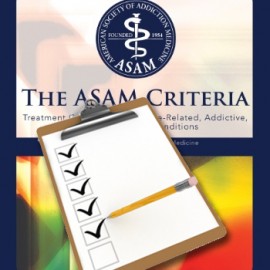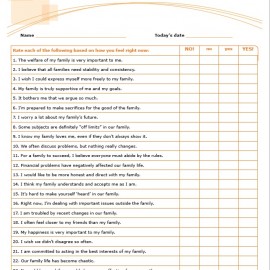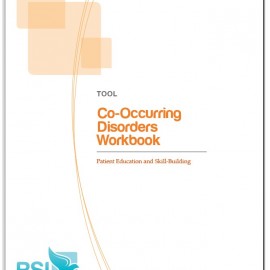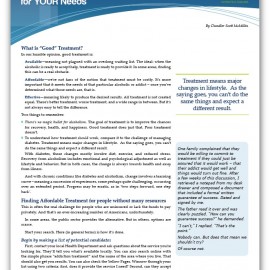Treatment
Easier, Softer Way
One thing’s for sure: it’ll be popular, because your typical alcoholic would rather not quit if he could think of an alternative.
Topics: addiction medication, craving, MAT, treatment models
Why Gender-Specific Rehab?
One benefit of gender-specific rehab is the reasons for initial substance-seeking can be appropriately addressed by the treatment team and can be processed with like-minded peers.
Topics: getting help
Addiction Treatment: The Double Standard
Addiction has been described as a chronic problem that we’ve attempted to treat as an acute illness –a big reason for the revolving door of relapse.
Topics: abstinence, MAT, program development, therapeutic models
Outpatient vs. Intensive Outpatient
The principle behind most ASAM-based systems is to treat clients at the “least restrictive” level at which they can benefit.
Topics: ASAM, assessment, diagnosis, types of treatment, utilization review
Family Inventory: Priorities and Values
By the time a client lands in treatment, it may be hard to tell whether their family relationships offer a potential asset or a problem set to address.
Topics: assessment, communication, family involvement, therapies and tools, treatment planning
Build Client Decision-Making Skills With Football
The point of the game is to win. You win by knowing the odds and trying to take advantage of them. Even if that means resisting emotional impulses.
Topics: client engagement and motivation, counseling skills, decision making, patient education
Co-Occurring Disorders Workbook
The workbook is based on recognized disease-model treatment principles and can integrate readily in Matrix and other established EBP treatment protocols.
Topics: co-occurring disorders, patient education, program development
Complex Case: The Devil We Know
There’s this big group we lump under the heading ‘precontemplation’. But in practice, there are precontemplators, and pre-pre-contemplators, and pre-pre-pre-pre-pre-contemplators.
Topics: client types and needs, clinical management, co-occurring disorders, treatment models
Different Levels of Treatment: Who Gets What
For the most part, if you are hoping that insurance, Medicare or Medicaid, or another third-party payor will help with–or pick up entirely–the costs of treatment, you’ll be running into ASAM criteria that control who gets what kind of treatment.
Topics: ASAM, assessment, diagnosis, inpatient treatment, long term treatment, outpatient treatment, types of treatment
Finding the Best Addiction Treatment for YOUR Needs
There’s a third dimension to making the decision about which treatment will offer the best chance for recovery: Matching the characteristics of a program to an individual’s particular needs.
Topics: finding the right treatment, getting help, referral, types of treatment


















